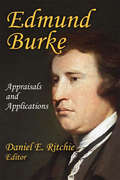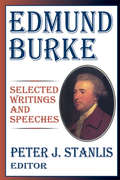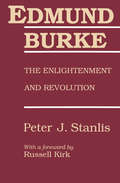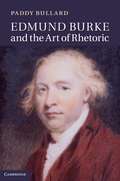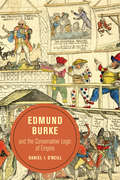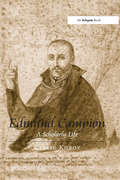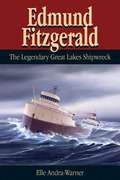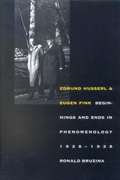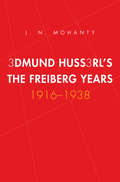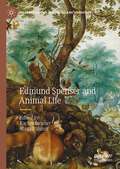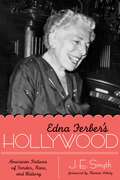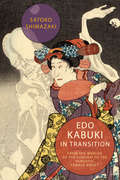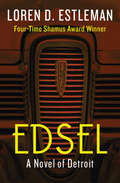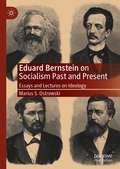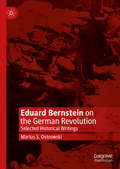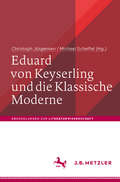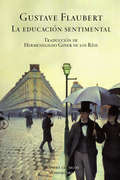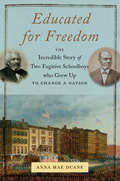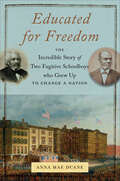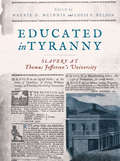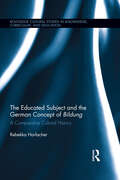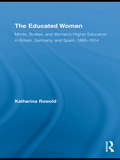- Table View
- List View
Edmund Burke: Appraisals and Applications (Library Of Conservative Thought Ser.)
by Daniel E. RitchieThe eighteenth century remains contemporary more than 200 years later because the fundamental questions raised then about politics in both the American and French Revolutions still speak to us. The writings of Edmund Burke on these and other political events of his time are today acknowledged as the basis of modern conservative thought. This volume brings together an outstanding collection of interpretative essays on Burke, and serves as a basic introduction to this seminal thinker.A member of the British Parliament from 1766 to 1794, Edmund Burke had sympathized with the American War of Independence and argued for reform of British policy toward Ireland and India, but he surprised many of his friends by his early, vehement opposition to the French Revolution. This volume brings together assessments of these and other statements by Burke by contemporaries such as Samuel Taylor Coleridge and William Hazlitt, along with essays by Irving Babbitt and Russell Kirk, who established his significance for twentieth-century conservatism.This is a collection of the best, previously published interpretive essays on Burke. It will be of interest to all those interested in the philosophical roots of conservatism, in the history of political thought, in revolution, and in modern political ideologies.
Edmund Burke: Essential Works and Speeches (The Library of Conservative Thought #Vol. 1)
by Peter StanlisIn this unique book, Peter J. Stanlis, the leading Burke scholar in America, has collected all the most important works and speeches of Edmund Burke (1729-1797), British statesman, political philosopher, and founder of modern conservative thought and, with due care to preserve the beauty of Burke's prose, edited them down to their essentials."The main purpose of these selections," Stanlis explains, "is to present extensive and in the main unbroken samples of Burke's most representative thought in his most characteristic style, on a great variety of subjects."In this major effort you can find--to name only a few topics covered--Burke's defense of ordered liberty, his advocacy of secure property rights, his love of Christianity and Europe's moral tradition, and his impassioned jeremiad against the orgy of destruction that the French Revolution became. Stanlis's general introduction gives important insight into Burke's early life, education, professional training, literary and political career, prose style, political philosophy, and more. In addition, each selection is preceded by a headnote that clarifies the selections in their historical context and includes a brief analytical interpretation. A chronology highlights important dates in Burke's life and career.In its compactness and comprehensiveness, this volume is the quintessential Burke reader. It will be of interest to historians, political scientists, and students of literature and intellectual history.
Edmund Burke: The Enlightenment and Revolution (The Library of Conservative Thought #Vol. 1)
by Peter J. StanlisTwo centuries after Edmund Burke published his Reflections on the Revolution in France, his name and reputation stand alongside Locke, Montesquieu, and Hume - the other still-cited grand political thinkers of the eighteenth century. For those great nations that have fallen into what Burke called "the antagonist world of madness, discord, vice, confusion and unavailing sorrow," the work of Burke supplies that sense of order, justice and freedom the present age seems to require.This volume by Peter Stanlis has grown out of almost four decades of studying Burke. Today, Professor Stanlis is called by Russell Kirk "the leading American authority on the political thought of the great conservative reformer." The book is divided into three categories: Burke on law and politics; Burke's criticism of Enlightenment rationalism and sensibility; and Burke's theory of revolution and critique of the English revolution of 1688.Stanlis' reasons' for linking Burke to the English Revolution rather than the later, and admittedly more decisive American and French Revolutions of his own time, is that for Burke, that earlier event was the normative pivot for judging how to make important changes in civil society. Indeed, even in his writings on the contemporary revolutions of his time,. Stanlis reminds us that Burke interpreted revolutionary events in France and Americas through the prism of the bloodless Revolution of 1688.
Edmund Burke and the Art of Rhetoric
by Paddy BullardEdmund Burke ranks among the most accomplished orators ever to debate in the British Parliament. But often his eloquence has been seen to compromise his achievements as a political thinker. In the first full-length account of Burke's rhetoric, Bullard argues that Burke's ideas about civil society, and particularly about the process of political deliberation, are, for better or worse, shaped by the expressiveness of his language. Above all, Burke's eloquence is designed to express ethos or character. This rhetorical imperative is itself informed by Burke's argument that the competency of every political system can be judged by the ethical knowledge that the governors have of both the people that they govern and of themselves. Bullard finds the intellectual roots of Burke's 'rhetoric of character' in early modern moral and aesthetic philosophy, and traces its development through Burke's parliamentary career to its culmination in his masterpiece, Reflections on the Revolution in France.
Edmund Burke and the Conservative Logic of Empire
by Daniel O'NeillEdmund Burke, long considered modern conservatism's founding father, is also widely believed to be an opponent of empire. However, Daniel O'Neill turns that latter belief on its head. This fresh and innovative book shows that Burke was a passionate supporter and staunch defender of the British Empire in the eighteenth century, whether in the New World, India, or Ireland. Moreover--and against a growing body of contemporary scholarship that rejects the very notion that Burke was an exemplar of conservatism--O'Neill demonstrates that Burke's defense of empire was in fact ideologically consistent with his conservative opposition to the French Revolution. Burke's logic of empire relied on two opposing but complementary theoretical strategies: Ornamentalism, which stressed cultural similarities between "civilized" societies, as he understood them, and Orientalism, which stressed the putative cultural differences distinguishing "savage" societies from their "civilized" counterparts. This incisive book also shows that Burke's argument had lasting implications, as his development of these two justifications for empire prefigured later intellectual defenses of British imperialism.
Edmund Campion: A Scholarly Life
by Gerard KilroyEdmund Campion: A Scholarly Life is the response, at long last, to Evelyn Waugh’s call, in 1935, for a ’scholarly biography’ to replace Richard Simpson's Edmund Campion (1867). Whereas early accounts of his life focused on the execution of the Jesuit priest, this new biography presents a more balanced assessment, placing equal weight on Campion’s London upbringing among printers and preachers, and on his growing stature as an orator in an Oxford riven with religious divisions. Ireland, chosen by Campion as a haven from religious conflict, is shown, paradoxically, to have determined his life and his death. Gerard Kilroy here draws on newly discovered manuscript sources to reveal Campion as a charismatic and affectionate scholar who was finding fulfilment as priest and teacher in Prague when he was summoned to lead the first Jesuit mission to England. The book argues that the delays in his long journey suggest reluctant acceptance, even before he was told that Dr Nicholas Sander had brought ’holy war’ to Ireland, so that Campion landed in an England that was preparing for papal invasion. The book offers fresh insights into the dramatic search for Campion, the populist nature of the disputations in the Tower, and the legal issues raised by his torture. It was the monarchical republic itself that, in pursuit of the Anjou marriage, made him the beloved ’champion’ of the English Catholic community. Edmund Campion: A Scholarly Life presents the most detailed and comprehensive picture to date of an historical figure whose loyalty and courage, in the trial and on the scaffold, swiftly became legendary across Europe.
Edmund Fitzgerald: The Legendary Great Lakes Shipwreck
by Ella Andra-WarnerSuperior Never Gives Up Her Dead. On November 10, 1975, the massive ore carrier Edmund Fitzgerald succumbed to a stormy Lake Superior, leaving no survivors. Memorialized in song and legend, the Fitzgerald's tragic, final voyage is a compelling story. As Canadian author Elle Andra-Warner tells of the most famous Great Lakes shipwreck, she masterfully weaves in the lore and history of the men who sail these unsalted seas.
Edmund Husserl and Eugen Fink: Beginnings and Ends in Phenomenology, 1928-1938
by Ronald BruzinaEugen Fink was Edmund Husserl's research assistant during the last decade of the renowned phenomenologist's life, a period in which Husserl's philosophical ideas were radically recast. In this landmark book, Ronald Bruzina shows that Fink was actually a collaborator with Husserl, contributing indispensable elements to their common enterprise. Drawing on hundreds of hitherto unknown notes and drafts by Fink, Bruzina highlights the scope and depth of his theories and critiques. He places these philosophical formulations in their historical setting, organizes them around such key themes as the world, time, life, and the concept and methodological place of the "meontic," and demonstrates that they were a pivotal impetus for the renewing of "regress to the origins" in transcendental-constitutive phenomenology.
Edmund Husserl's Freiburg Years 1916-1938
by J. N. MohantyIn his award-winning book The Philosophy of Edmund Husserl: A Historical Development, J.N. Mohanty charted Husserl's philosophical development from the young man's earliest studies--informed by his work as a mathematician--to the publication of his Ideas in 1913. In this welcome new volume, the author takes up the final decades of Husserl's life, addressing the work of his Freiburg period, from 1916 until his death in 1938. As in his earlier work, Mohanty here offers close readings of Husserl's main texts accompanied by accurate summaries, informative commentaries, and original analyses. This book, along with its companion volume, completes the most up-to-date, well-informed, and comprehensive account ever written on Husserl's phenomenological philosophy and its development.
Edmund Spenser and Animal Life (Palgrave Studies in Animals and Literature)
by Rachel Stenner Abigail ShinnThis book is the first extended critical study of the early modern poet Edmund Spenser from the perspective of animal studies. With an introduction situating Spenser in current discussions of animal life and literary form, and early modern animal studies, the book proceeds in four sections: “Animals and Cultural Practices”; “Animals, Slavery, and Race”; “Animals in Complaints”; “Readers and Poetics in The Faerie Queene”. Contributors discuss a broad range of Spenser’s work, putting it into dialogue with a number of early modern discourses, including politics, poetics, and natural history.
Edna Ferber's Hollywood: American Fictions of Gender, Race, and History (Texas Film and Media Studies Series)
by J. E. SmythEdna Ferber's Hollywood reveals one of the most influential artistic relationships of the twentieth century--the four-decade partnership between historical novelist Edna Ferber and the Hollywood studios. Ferber was one of America's most controversial popular historians, a writer whose uniquely feminist, multiracial view of the national past deliberately clashed with traditional narratives of white masculine power. Hollywood paid premium sums to adapt her novels, creating some of the most memorable films of the studio era--among them Show Boat, Cimarron, and Giant. Her historical fiction resonated with Hollywood's interest in prestigious historical filmmaking aimed principally, but not exclusively, at female audiences. In Edna Ferber's Hollywood, J. E. Smyth explores the research, writing, marketing, reception, and production histories of Hollywood's Ferber franchise. Smyth tracks Ferber's working relationships with Samuel Goldwyn, Leland Hayward, George Stevens, and James Dean; her landmark contract negotiations with Warner Bros. ; and the controversies surrounding Giant's critique of Jim-Crow Texas. But Edna Ferber's Hollywood is also the study of the historical vision of an American outsider--a woman, a Jew, a novelist with few literary pretensions, an unashamed middlebrow who challenged the prescribed boundaries among gender, race, history, and fiction. In a masterful film and literary history, Smyth explores how Ferber's work helped shape Hollywood's attitude toward the American past.
Edna Ferber's Hollywood: American Fictions of Gender, Race, and History (Texas Film and Media Studies Series)
by J. E. SmythEdna Ferber’s Hollywood reveals one of the most influential artistic relationships of the twentieth century—the four-decade partnership between historical novelist Edna Ferber and the Hollywood studios. Ferber was one of America’s most controversial popular historians, a writer whose uniquely feminist, multiracial view of the national past deliberately clashed with traditional narratives of white masculine power. Hollywood paid premium sums to adapt her novels, creating some of the most memorable films of the studio era—among them Show Boat, Cimarron, and Giant. Her historical fiction resonated with Hollywood’s interest in prestigious historical filmmaking aimed principally, but not exclusively, at female audiences. In Edna Ferber’s Hollywood, J. E. Smyth explores the research, writing, marketing, reception, and production histories of Hollywood’s Ferber franchise. Smyth tracks Ferber’s working relationships with Samuel Goldwyn, Leland Hayward, George Stevens, and James Dean; her landmark contract negotiations with Warner Bros.; and the controversies surrounding Giant’s critique of Jim-Crow Texas. But Edna Ferber’s Hollywood is also the study of the historical vision of an American outsider—a woman, a Jew, a novelist with few literary pretensions, an unashamed middlebrow who challenged the prescribed boundaries among gender, race, history, and fiction. In a masterful film and literary history, Smyth explores how Ferber’s work helped shape Hollywood’s attitude toward the American past.
Edo Kabuki in Transition: From the Worlds of the Samurai to the Vengeful Female Ghost
by Satoko ShimazakiSatoko Shimazaki revisits three centuries of kabuki theater and its dynamic representations of medieval Japanese tales and tradition, boldly reframing Edo kabuki as a key player in the formation of an early modern urban identity. Challenging the common understanding of kabuki as a subversive entertainment and a threat to shogunal authority, Shimazaki argues that kabuki actually instilled a sense of shared history in Edo's inhabitants, regardless of their class. It did this, she shows, by constantly invoking "worlds," or sekai, largely derived from medieval military chronicles, and overlaying them onto the present. Shimazaki explores the process by which, as the early modern period drew to a close, nineteenth-century playwrights began dismantling the Edo tradition of "presenting the past" by abandoning their long-standing reliance on the sekai. She then reveals how, in the 1920s, a new generation of kabuki playwrights, critics, and scholars reinvented the form yet again, "textualizing" kabuki so that it could be pressed into service as a guarantor of national identity, in keeping with the role that the West assigned to theater. Shimazaki's vivid and engaging reinterpretation of kabuki history centers on the popular and widely celebrated ghost play Tokaido Yotsuya kaidan (Ghost Stories at Yotsuya, 1825) by Tsuruya Nanboku. Along the way, she sheds fresh light on the emergence and development of the ubiquitous trope of the vengeful female ghost, linking it to the need to explore new themes at a time when the old samurai worlds were rapidly losing their relevance.
Edo Kabuki in Transition: From the Worlds of the Samurai to the Vengeful Female Ghost
by Satoko ShimazakiSatoko Shimazaki revisits three centuries of kabuki theater, reframing it as a key player in the formation of an early modern urban identity in Edo Japan and exploring the process that resulted in its re-creation in Tokyo as a national theatrical tradition. Challenging the prevailing understanding of early modern kabuki as a subversive entertainment and a threat to shogunal authority, Shimazaki argues that kabuki instilled a sense of shared history in the inhabitants of Edo (present-day Tokyo) by invoking "worlds," or sekai, derived from earlier military tales, and overlaying them onto the present. She then analyzes the profound changes that took place in Edo kabuki toward the end of the early modern period, which witnessed the rise of a new type of character: the vengeful female ghost.Shimazaki's bold reinterpretation of the history of kabuki centers on the popular ghost play Tokaido Yotsuya kaidan (The Eastern Seaboard Highway Ghost Stories at Yotsuya, 1825) by Tsuruya Nanboku IV. Drawing not only on kabuki scripts but also on a wide range of other sources, from theatrical ephemera and popular fiction to medical and religious texts, she sheds light on the development of the ubiquitous trope of the vengeful female ghost and its illumination of new themes at a time when the samurai world was losing its relevance. She explores in detail the process by which nineteenth-century playwrights began dismantling the Edo tradition of "presenting the past" by abandoning their long-standing reliance on the sekai. She then reveals how, in the 1920s, a new generation of kabuki playwrights, critics, and scholars reinvented the form again, "textualizing" kabuki so that it could be pressed into service as a guarantor of national identity.
Edsel: A Novel Of Detroit (The Detroit Novels #4)
by Loren D. EstlemanHired to promote the new American dream car, a former reporter finds himself mired in a deadly conspiracy against a union boss and Ford Motors itselfIt&’s only been two decades since Connie Minor was on top, but it feels like centuries. Once a journalist, Minor spent Prohibition with his finger on gangland&’s pulse, a confidant of every rumrunner, boss, and triggerman in Detroit. But as the gangsters fell, Minor went with them, replaced by a generation of reporters more interested in the Nazi Party than the inner workings of the Purple Gang. Now it&’s the 1950s, and after years writing mindless ad copy, Minor fears that his brain may be permanently atrophied—that is, until an exciting new job drops on his desk. Minor is hired to sell Ford&’s most original creation, the Edsel, meant to take America by storm. But the job quickly reintroduces him to some ugly old Detroit faces. When he uncovers a conspiracy against both a union leader and the new car, his reporter&’s instincts kick in. It&’s been years since Minor gabbed with mobsters, but it&’s never too late for an old newspaperman to get whacked. This ebook features an illustrated biography of Loren D. Estleman including rare photos from the author&’s personal collection.
Eduard Bernstein on Socialism Past and Present: Essays and Lectures on Ideology
by Marius S. OstrowskiThis book presents six major texts and selected shorter writings by the social-democratic thinker and politician Eduard Bernstein, translated into English for the first time: Socialism Past and Present; The Social Doctrine of Anarchism; Social Liberalism or Collectivism?; How is Scientific Socialism Possible?; What is Socialism?; The Socialisation of Enterprises; and articles from the periodicals Neue Zeit and Sozialistische Monatshefte alongside several unpublished manuscripts. Written over the period 1893 to 1931, these works focus on socialism as an ideology, and trace debates about ethics, social science, and class struggle that preoccupied the early-20th-century socialist movement. Bernstein carefully demarcates the boundaries between socialism and its ideological rivals, contrasting its communitarian aspirations with individualistic liberalism and anarchism, and its adherence to democratic methods with the totalitarian violence of communism and fascism. He revisits the intellectual canon of socialist thought, recentring contributions by Ferdinand Lassalle, Karl Rodbertus, and other neglected figures alongside those of Karl Marx and Friedrich Engels. Urging socialists to seize the opportunities afforded by their growing political representation, Bernstein addresses the strategies needed to achieve progressive policy reforms, including the prospects for realising socialism with the foundation of the Weimar Republic. 'In this illuminating collection, Marius Ostrowski brings together several essays by Eduard Bernstein, spanning a forty-year period of activity and addressing the question of “what is socialism”. At a time of renewed reflection on the foundation and value of social democracy, engaging with the thought of one of its founding fathers will be immeasurably valuable for both supporters and critics.' —Professor Lea Ypi, London School of Economics, UK 'During his long life, Eduard Bernstein made a contribution of great significance to both the theoretical and political development of the left, emerging as a founding figure of European social democracy. In this splendid volume, Marius Ostrowski presents Bernstein’s writing in its full richness and complexity, bringing together his lucid translations into English of some of the major theoretical works published by Bernstein during the years of the Weimar Republic. This book makes a valuable contribution to our understanding of the development of the socialist tradition during a period of great political turmoil, and gives us a three-dimensional understanding of Bernstein’s contributions to socialism and social democracy.' — Dr Martin O’Neill, University of York, UK
Eduard Bernstein on the German Revolution: Selected Historical Writings
by Marius S. OstrowskiThis book presents two major texts and selected shorter writings by the social-democratic thinker and politician Eduard Bernstein, translated into English in full for the first time: The German Revolution: A History of the Emergence and First Working Period of the German Republic; How A Revolution Perished; and articles from Vorwärts and other socialist periodicals. Written in the aftermath of the 1918 German Revolution and the end of WWI, they address the overthrow of autocratic rule in Germany, and provide a live chronicle and retrospective assessment of the Weimar Republic’s foundation. Bernstein gives a detailed chronology of the German Revolution and its intellectual, economic, and political context, and offers a historical analogy in his account of the 1848 French Revolution, which differs in key respects from that of Karl Marx in The Eighteenth Brumaire of Louis Napoleon. Drawing on his own experience of the events he describes, he revisits the socialist debate over ‘reform or revolution’ that he himself had provoked at the turn of the 20th century, and consciously seeks to wrest ownership of the Revolution’s legacy away from the Spartacist and communist left. In these works, Bernstein exhorts social democrats to rally behind the nascent Republic and resist the siren-calls of its militant opponents on radical left and right, and he engages with themes of party unity, political violence, democracy, and the role of ideology that have echoed through left theory and strategy ever since.
Eduard von Keyserling und die Klassische Moderne (Abhandlungen zur Literaturwissenschaft)
by Christoph Jürgensen Michael ScheffelEduard von Keyserlings Werk geriet, trotz prominenter Fürsprecher wie Hermann Hesse, Herman Bang oder Thomas Mann, so häufig in Vergessenheit, wie es wiederentdeckt wurde. Zumeist erscheint Keyserling als ästhetischer Spätling, der nostalgisch von untergehenden baltischen Welten erzählt. Der zum 100. Todestag konzipierte Band zeichnet hingegen Keyserlings skeptische Moderne und mithin seinen Beitrag zur ‚Klassische Moderne‘ nach. Die Studien zu den Romanen, Dramen und Essays situieren den Autor in den Diskursen und der literarischen Szene der Zeit und untersuchen u.a. Erzählstrategien und Gender-Diskurse sowie die Werkpoetik Keyserlings. Der Befund zeigt, dass sich bei Keyserling (thematisch) sentimentale Rückblicke auf die Zeit vor der Moderne verbinden mit (formal) Stilmitteln der Moderne und schließlich (diskursiv) einer Reflexion über die Moderne. Entsprechend begleitet er ‚seine‘ Epoche von ihren Anfängen bis in ihr Auslaufen.
La educación sentimental (edición ilustrada)
by Gustave FlaubertPreciosa edición de la obra maestra de Flaubert con ilustraciones de André Dunoyer de Segonzac, procedentes de la edición que Librairie de France París publicó en 1922 con motivo del centenario del autor. «No leáis La educación sentimental como los niños: por diversión; ni por instrucción, como los ambiciosos. Leedla para vivir.»Gustave Flaubert La historia de un ambicioso joven de provincias que se enamora de una mujer casada sirvió a Flaubert para crear uno de los hitos estilísticos de la literatura universal, La educación sentimental (1869), quizá su obra maestra, sin duda una de las novelas más perdurables de todos los tiempos. En la cubierta del barco que le lleva de París a su ciudad natal, Frédéric Moreau se quedará prendado de la belleza de la señora Arnoux. Este será el punto de arranque de las tribulaciones de un joven que sueña con alcanzar fama y fortuna y que, de regreso a París, frecuentará al señor Arnoux para estar cerca de su secreto amor. Todo ello tendrá lugar en un escenario esplendoroso, el París de mediados del siglo XIX, la capital de la burguesía emergente, donde la intensidad del placer se mezcla con el inevitable tedio y el resplandor de uno de los periodos cruciales de la historia europea: la revolución de 1848. «Todas las calles conducían a su casa; los coches se estacionaban en las plazas, únicamente para ir allá más deprisa.»
Educated for Freedom: The Incredible Story of Two Fugitive Schoolboys Who Grew Up to Change a Nation
by Anna Mae DuaneThe powerful story of two young men who changed the national debate about slavery In the 1820s, few Americans could imagine a viable future for black children. Even abolitionists saw just two options for African American youth: permanent subjection or exile. Educated for Freedom tells the story of James McCune Smith and Henry Highland Garnet, two black children who came of age and into freedom as their country struggled to grow from a slave nation into a free country. Smith and Garnet met as schoolboys at the Mulberry Street New York African Free School, an educational experiment created by founding fathers who believed in freedom’s power to transform the country. Smith and Garnet’s achievements were near-miraculous in a nation that refused to acknowledge black talent or potential. The sons of enslaved mothers, these schoolboy friends would go on to travel the world, meet Revolutionary War heroes, publish in medical journals, address Congress, and speak before cheering crowds of thousands. The lessons they took from their days at the New York African Free School #2 shed light on how antebellum Americans viewed black children as symbols of America’s possible future. The story of their lives, their work, and their friendship testifies to the imagination and activism of the free black community that shaped the national journey toward freedom.
Educated for Freedom: The Incredible Story of Two Fugitive Schoolboys Who Grew Up to Change a Nation
by Anna Mae DuaneThis &“revealing dual biography . . . succeeds in lifting up two underappreciated figures of the antislavery movement" (Publishers Weekly). In the 1820s, few Americans could imagine a viable future for black children. In Educated for Freedom, Anna Mae Duane tells the story of James McCune Smith and Henry Highland Garnet, two black children who came of age and into freedom as their country struggled to grow from a slave nation into a free country. Smith and Garnet met as schoolboys at the Mulberry Street New York African Free School, an educational experiment created by founding fathers who believed in freedom&’s power to transform the country. Smith became the first African American to run a pharmacy and used his medical expertise to refute notions of black inferiority. Garnet became a minister whose oratory reputation surpassed even that of Frederick Douglass. The sons of enslaved mothers, these schoolboy friends would go on to travel the world, address Congress, and speak before cheering crowds of thousands. The lessons they took from their days at the New York African Free School #2 shed light on how antebellum Americans viewed black children as symbols of America&’s possible future. The story of their lives, their work, and their friendship testifies to the imagination and activism of the free black community that shaped the national journey toward freedom.
Educated in Tyranny: Slavery at Thomas Jefferson’s University
by Maurie D. McInnis Kirt von von Daacke Benjamin Ford Louis P. Nelson James Zehmer Jessica E. Sewell Andrew JohnstonFrom the University of Virginia’s very inception, slavery was deeply woven into its fabric. Enslaved people first helped to construct and then later lived in the Academical Village; they raised and prepared food, washed clothes, cleaned privies, and chopped wood. They maintained the buildings, cleaned classrooms, and served as personal servants to faculty and students. At any given time, there were typically more than one hundred enslaved people residing alongside the students, faculty, and their families. The central paradox at the heart of UVA is also that of the nation: What does it mean to have a public university established to preserve democratic rights that is likewise founded and maintained on the stolen labor of others? In Educated in Tyranny, Maurie McInnis, Louis Nelson, and a group of contributing authors tell the largely unknown story of slavery at the University of Virginia. While UVA has long been celebrated as fulfilling Jefferson’s desire to educate citizens to lead and govern, McInnis and Nelson document the burgeoning political rift over slavery as Jefferson tried to protect southern men from anti-slavery ideas in northern institutions. In uncovering this history, Educated in Tyranny changes how we see the university during its first fifty years and understand its history hereafter.
The Educated Subject and the German Concept of Bildung: A Comparative Cultural History (Routledge Cultural Studies in Knowledge, Curriculum, and Education #2)
by Rebekka HorlacherGerman education plays a huge role in the development of education sciences and modern universities internationally. It is influenced by the educational concept of Bildung, which defines Germany ‘s theoretical and curricular ventures. This concept is famously untranslatable into other languages and is often misinterpreted as education, instruction, training, upbringing and other terms which don’t encompass its cultural ambitions. Despite this hurdle, Bildung is now being recognized in current discussions of education issues such as standardization, teaching to the test, evidence-based policy and high stakes testing. This volume clears up the confusion and misunderstandings surrounding Bildung by examining the origins of the concept and how it has been applied throughout history. It paves the way for educators to fully understand and benefit from this model and all it has to offer.
The Educated Woman: Minds, Bodies, and Women's Higher Education in Britain, Germany, and Spain, 1865-1914 (Routledge Research in Gender and History)
by Katharina RowoldThe Educated Woman is a comparative study of the ideas on female nature that informed debates on women’s higher education in the late nineteenth and early twentieth centuries in three western European countries. Exploring the multi-layered roles of science and medicine in constructions of sexual difference in these debates, the book also pays attention to the variety of ways in which contemporary feminists negotiated and reconstituted conceptions of the female mind and its relationship to the body. While recognising similarities, Rowold shows how in each country the higher education debates and the underlying conceptions of women’s nature were shaped by distinct historical contexts.
Educating America's Military (Cass Military Studies)
by Joan Johnson-FreeseThis book offers a detailed examination of the professional military education system in the United States, from a critical, insider's perspective. The mission of America’s war colleges is to educate senior military officers in both the ways of war and the defence of peace. But are these colleges doing the best job possible in carrying out that important mission? Military education faces many demands, including a lack of preparation by the students, uneven quality of the faculty, and confusion over the curriculum. Many officers attend resident programs at the war colleges programs against the career advice of their leadership, despite the fact that they are virtually guaranteed graduation after less than a year of study, while others do their best to avoid it entirely. As the professional military education system has come under increasing scrutiny and criticism, some have even called for closing the war colleges. That answer, however, does not serve the United States well, especially in a complex, globalized environment, where military leaders need the best specialized education to prepare them for their future challenges. This volume examines the system that created and supports the perpetuation of this system, and why it is imperative that it be fixed. Written by a faculty member at a military college with twenty years' experience of the PME system, this book will of much interest to students of the US Military, US politics and military education in general.
